Your sales team sends out pitch decks and waits. Days pass with no response. You follow up blindly, unsure if anyone even opened it. Sound familiar? The problem isn’t your pitch. It’s that your deck is disconnected from your sales process. When your pitch deck software integrates with a platform like monday CRM, every view becomes actionable intelligence.
This guide cuts through the noise to show you what actually matters: the essential features that drive results, AI tools that save hours, and how to connect your pitch deck to your CRM for a seamless workflow that closes more deals.
What is pitch deck software
Pitch deck software gives your team a strategic edge for high-stakes presentations. It goes beyond standard tools with targeted templates, real-time collaboration, and professional polish that builds confidence when it matters most.
The real power comes after you hit send. You’ll see exactly who viewed your deck, which slides captured attention, and when to follow up: transforming guesswork into data-driven action.
When integrated with monday CRM, these insights fuel your entire sales process. Every view triggers smart follow-ups, keeping deals moving forward automatically.
Who needs professional pitch software
Professional pitch deck software delivers the most value for teams where presentations directly impact revenue and strategic outcomes. Here’s who benefits most:
- Startup founders raising capital: When pitching VCs or angel investors, professional polish and engagement analytics help you stand out in competitive funding rounds and refine your story based on investor interest.
- Enterprise sales teams: Reps pursuing high-value deals need presentations that reflect their professionalism while tracking which slides resonate with multiple decision-makers across long sales cycles.
- Business development teams: When building strategic partnerships, you need to manage complex stakeholder relationships and track engagement across organizations to maintain alignment and momentum.
- Account executives managing key accounts: Customer-facing teams benefit from data-driven insights that show what content drives engagement, helping them tailor presentations and strengthen relationships.
- Marketing and growth teams: Teams presenting to leadership or external partners need consistent, on-brand decks with analytics that prove which messaging drives results.
The common thread: these teams need more than slides. They need intelligence that transforms presentations from one-off events into ongoing, data-driven conversations that drive collective success.
Essential features of the best pitch deck builders
The right pitch deck software should do more than help you build slides. It should power your entire sales process. Here are the non-negotiable features that separate basic presentation tools from true sales enablers:
- Real-time collaboration: Your team needs to work together seamlessly, refining narratives and gathering feedback without endless email chains or version-control nightmares. Look for platforms where multiple stakeholders can edit, comment, and approve simultaneously.
- Smart templates and brand controls: Consistency builds trust. The best tools enforce your visual identity automatically, applying correct colors, logos, and fonts to every slide so your team can focus on the message, not the style guide.
- Engagement analytics: Stop pitching into the void. Tracking capabilities reveal exactly which slides capture attention and where prospects lose interest, transforming your deck into an intelligence-gathering tool that refines your story based on what actually resonates.
- Secure, flexible sharing: Speed matters, but so does control. Look for platforms that let you send tracked links, monitor who’s viewing your deck, and revoke access when needed, ensuring your most valuable work stays in the right hands.
- CRM integration: The real power comes when your pitch deck connects directly to your sales pipeline. Integration eliminates manual data entry, automates follow-ups, and ensures every presentation is built on accurate, up-to-the-minute customer insights.
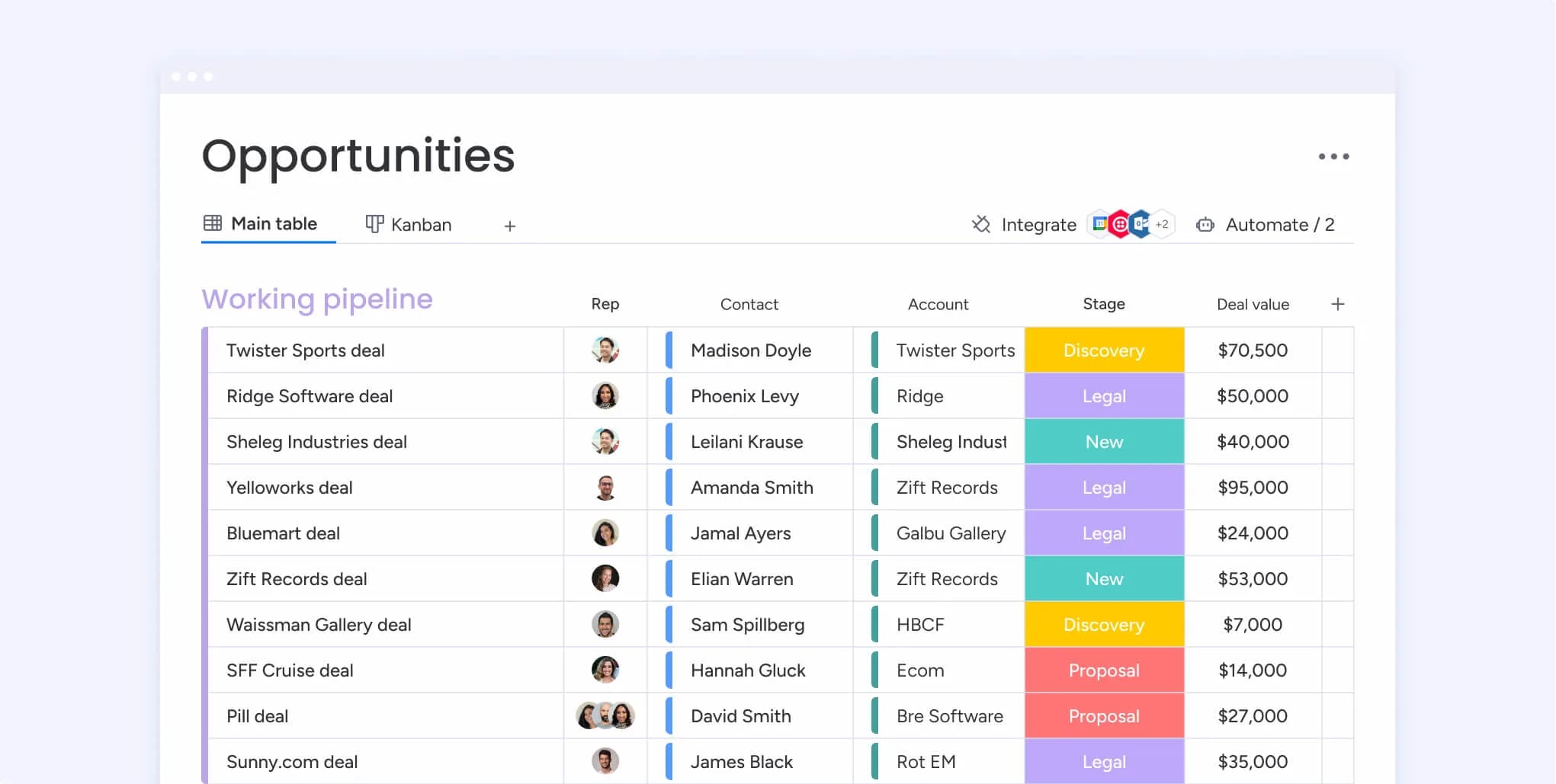
Pitch deck makers vs. pitch deck design services
Choosing between a DIY pitch deck maker and a professional design service comes down to three factors: timeline, budget, and customization needs.
DIY pitch deck makers give you speed and control. You’ll get templates, full autonomy, and a finished deck fast. It’s a perfect solution when you’re moving quickly on a tight budget.
Design services deliver custom, high-end results. You’re hiring expert partners to craft your story and visuals from scratch, which means higher costs and longer timelines; but a truly bespoke presentation.
Top pitch deck creators for every business need
Your pitch deck should drive deals forward, not slow your team down. The right tool connects seamlessly to your sales process, turning presentations into revenue-generating assets. Here’s how the top platforms stack up to help you find the perfect fit for your workflow.
| Platform | Best for | Key strength | Pricing model |
|---|---|---|---|
| monday CRM | Sales teams with CRM integration | Unified customer data | Subscription |
| Pitch.com | Design-focused teams | Real-time collaboration | Freemium |
| Slidebean | Startups seeking funding | AI-powered design | Subscription |
| Beautiful.ai | Non-designers | Automated formatting | Subscription |
| Canva | Small businesses | Ease of use | Freemium |
monday CRM
monday CRM transforms pitch deck management from a scattered process into a streamlined sales engine. The platform acts as a central hub for organizing, storing, and tracking your pitch decks, connecting them directly to your customer relationship management workflows.
It’s the go-to choice for sales teams who need their pitch materials to be as organized and efficient as they are.
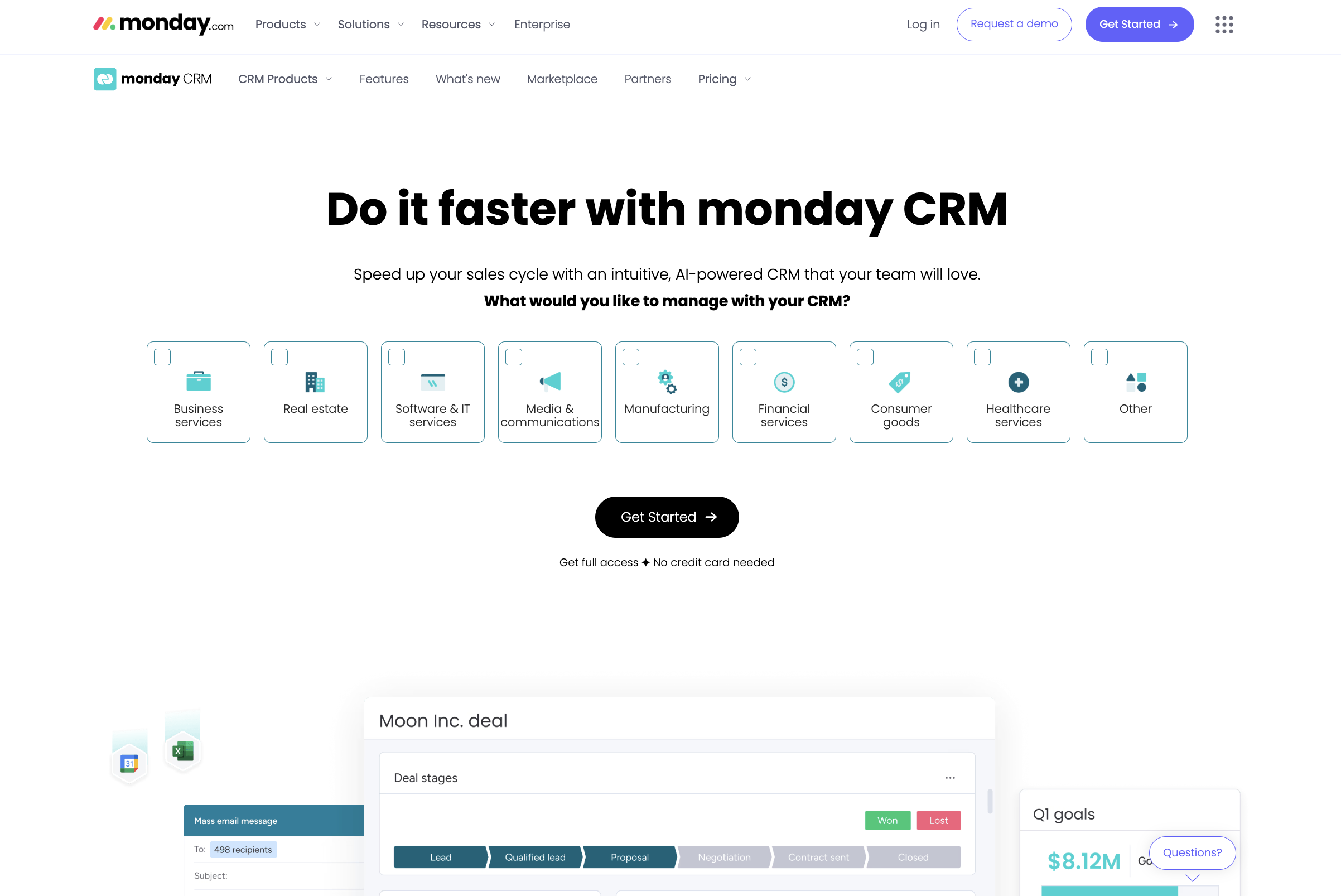
monday CRM serves as a centralized hub where sales teams can store, organize, and access the latest versions of their pitch decks (created in tools like PowerPoint or Google Slides) while tracking every interaction and follow-up activity within the complete sales pipeline.
Key features:
- Pitch deck management template: with customizable boards to track presentation status, ownership, and feedback
- Centralized document management: ensuring all team members access consistent, up-to-date presentation materials with full version control
- Live data dashboards: that provide real-time project progress and customer insights to help teams build more impactful presentations
Pricing:
- Free: $0 forever (up to 2 seats)
- Basic: $9/month per seat
- Standard: $12/month per seat
- Pro: $19/month per seat
- Enterprise: Contact sales for pricing
- Prices shown are for annual billing, which saves up to 18%. Monthly billing is also available.
- Paid plans require a minimum of 3 users.
Why it stands out:
- Complete sales ecosystem integration: connects pitch deck management directly with lead tracking, customer data, and follow-up workflows
- Real-time collaboration capabilities: enable distributed teams to provide feedback, manage approvals, and refine presentation strategy in one workspace
- Unified view of sales materials: lets reps quickly find the right deck for the right client, ensuring brand consistency and message alignment
Advanced AI features
- monday magic: automates workflow creation from simple text prompts, helping sales teams set up pitch tracking processes instantly
- AI-powered task automation: helps streamline follow-up actions and next steps based on deal stages and customer interactions
- Automated email composition: assists with drafting follow-up communications after a pitch, saving valuable time
Automations
- Pre-built automation recipes: notify team members when new pitch deck versions are uploaded or when specific deal stages require a presentation
- No-code workflow builders: create custom triggers for presentation approvals, stakeholder notifications, and post-pitch follow-up sequences
- Enterprise-scale automation: available on the Enterprise plan, handles up to 250,000 actions per month for large sales organizations
Integrations
- File-sharing platform connections: link directly with Google Drive, Dropbox, and OneDrive for seamless presentation storage and access
- Communication tool integrations: connect with Slack, Gmail, and Google Calendar to coordinate presentation schedules and team collaboration
- Presentation tool compatibility: allows for embedding monday.com boards directly into Pitch presentations to show live data
Pitch deck software features
- Branded asset organization: allows teams to store and categorize approved company logos, fonts, and visual elements for easy access when building presentations externally
- Collaborative feedback and approvals: enables multiple stakeholders to comment on files, assign revision tasks, and track presentation status in real time
- Pitch deck usage tracking: connects specific presentations to deal outcomes, helping managers see which materials are being used in the sales pipeline
Pitch.com
Pitch.com built its reputation on speed and visual polish, targeting teams where design quality matters as much as the message itself. The platform’s real-time collaboration engine lets multiple stakeholders refine presentations simultaneously. For agencies, consultancies, and creative teams who pitch frequently, Pitch delivers the workflow velocity they need without sacrificing aesthetic standards.
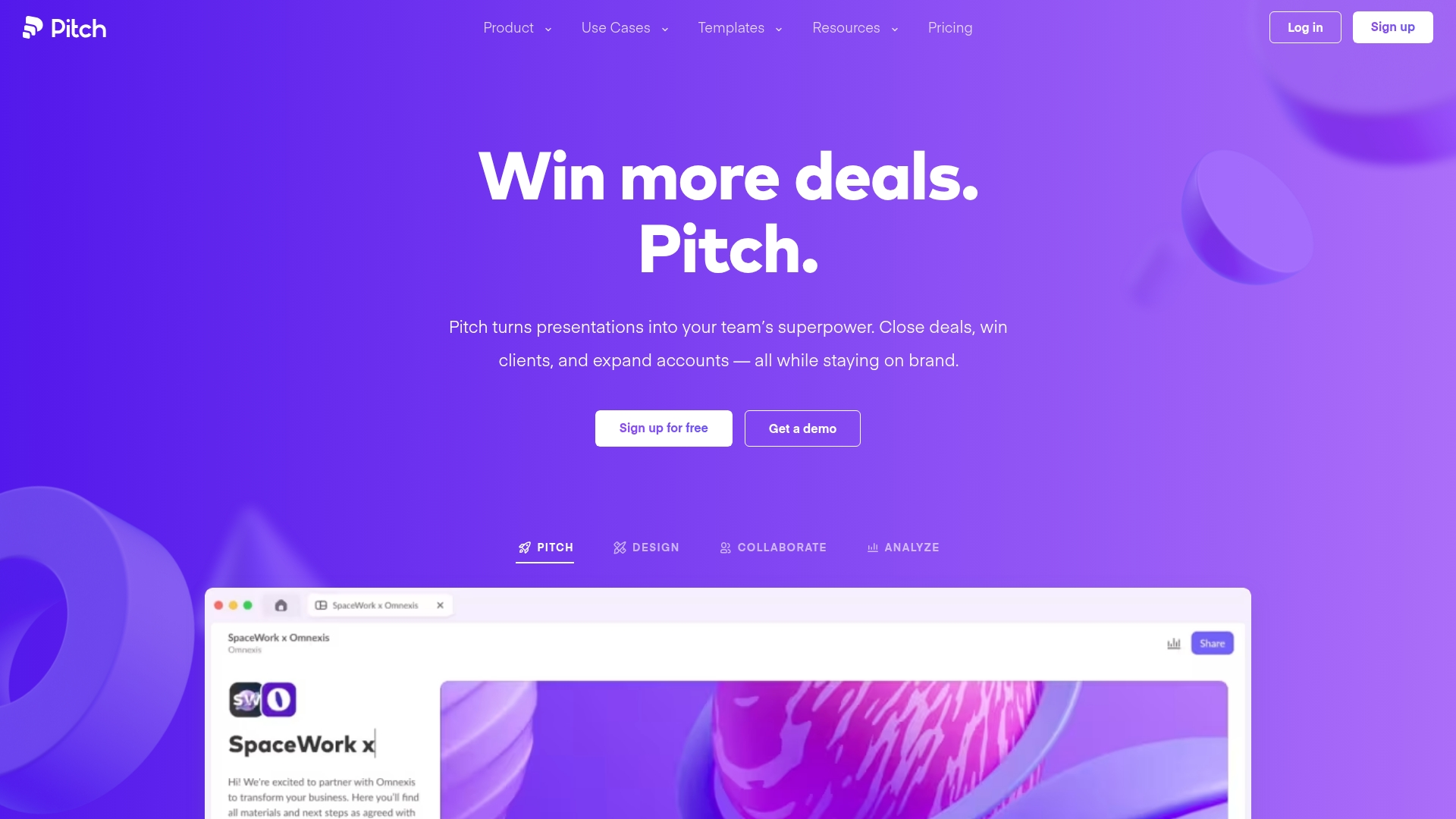
Pitch.com serves as a complete pitching platform for fast-moving teams who need to create, collaborate on, and share professional presentations with real-time editing and branded customization.
Key features:
- AI presentation maker that generates 11-slide decks in seconds based on custom inputs
- 100+ professionally designed templates with full customization and brand styling options
- Real-time collaboration with slide assignments, comments, and progress tracking across devices
Pricing:
- Free: $0 forever (5 members, unlimited presentations, AI creation, custom templates)
- Pro: $22/month yearly or $25/month (2 seats included, advanced links, pitch rooms, custom fonts)
- Business: $85/month yearly or $100/month (5 seats included, unlimited features, priority support)
- Enterprise: Custom pricing (SAML SSO, dedicated success manager, tailored onboarding)
Considerations:
- Recent company restructuring with significant layoffs may indicate market challenges
- Advanced analytics and premium features require paid plans, limiting functionality for free users
Slidebean
Slidebean automates the design heavy-lifting so founders can focus on what matters: telling their story. The platform uses AI to handle formatting and visual polish, letting you build investor-ready decks without wrestling with alignment or color schemes. You get 120+ templates modeled after decks that actually closed funding rounds. Beyond slides, Slidebean bundles in investor CRM tools and financial modeling templates, turning it into a command center for your entire fundraising campaign.

Slidebean provides an all-in-one fundraising platform that combines AI-powered pitch deck creation with investor management tools, financial modeling templates, and expert consulting services for startup founders preparing to raise capital.
Key features:
- AI pitch deck builder that creates presentations in seconds using just your company’s website URL
- 120+ professionally designed templates based on successful startups like Airbnb and Uber
- Integrated investor CRM and tracking tools to manage fundraising conversations and monitor presentation analytics
Pricing:
- Starter: $7/month (billed yearly)
- Accelerate: $42/month (billed yearly)
Considerations:
- Limited customization options may feel restrictive for users wanting granular design control
- Some users report inconsistent quality in consulting services and expert feedback sessions
Beautiful.ai
Beautiful.ai transforms pitch deck creation with AI-powered design assistance that automatically formats slides as you add content. The platform specializes in “Smart Slides” technology, making it ideal for founders and teams who need professional presentations without design expertise.
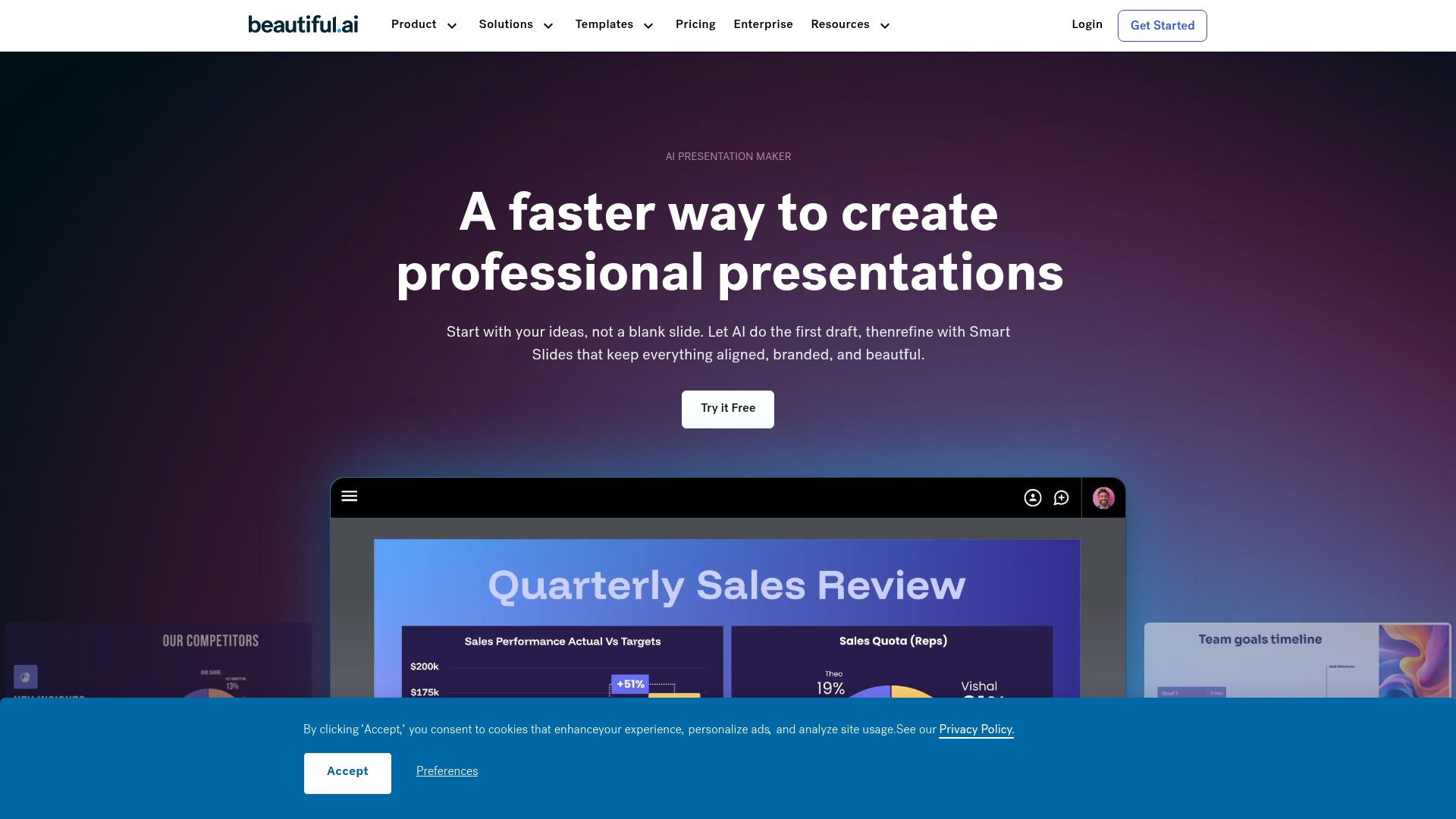
Beautiful.ai enables non-designers to create investor-ready pitch decks in minutes through intelligent templates that adapt layouts automatically based on your content.
Key features:
- DesignerBot generates complete presentations from simple text prompts using AI
- Smart Slide layouts with over 300 pre-designed templates that auto-adjust formatting
- Real-time collaboration tools with shared libraries and engagement analytics
Pricing:
- Pro: $12/month (billed annually) or $45/month (billed monthly)
- Team: $40/user/month (billed annually) or $50/user/month (billed monthly)
- Enterprise: Custom pricing for organizations with 20+ people
- Single Presentation: $45 one-time fee for quick projects
- Education: Free for one year with valid .edu email
- 14-day free trial available for Pro and Team plans
Considerations:
- Limited customization options due to design guardrails that prioritize consistency over creative freedom
- Web-only platform requires internet connection, with no offline editing capabilities
Canva
Canva transforms pitch deck creation with its drag-and-drop design platform that makes professional presentations accessible to everyone. The platform specializes in visual storytelling through an extensive library of 5,869+ customizable pitch deck templates, making it ideal for startups and small businesses who need compelling presentations without design expertise.
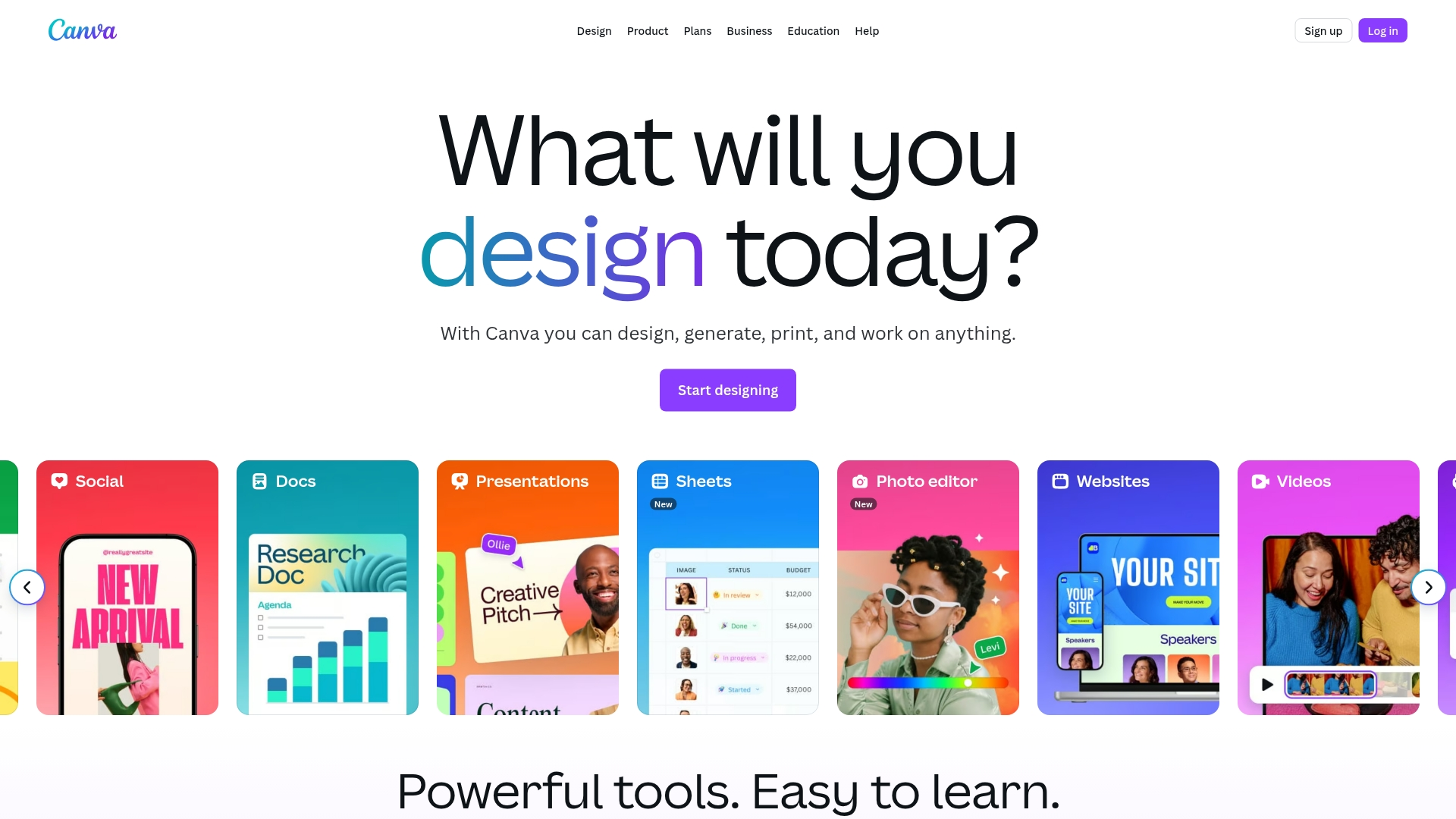
Canva empowers non-designers to create visually stunning pitch decks quickly through AI-powered design tools and professionally crafted templates.
Key features:
- Magic Design AI generates complete presentations from simple text prompts, including content and design suggestions
- Extensive template library with 5,869+ pitch deck templates covering various industries and presentation styles
- Real-time collaboration tools enable teams to work simultaneously on presentations with commenting and editing capabilities
Pricing:
- Canva Free: $0/year for one person
- Canva Pro: $120/year for one person
- Canva Teams: $100/year per person (minimum 3 people, $300/year total)
- Canva Enterprise: Contact sales for pricing
- Special offers: Free Teams subscription for nonprofits (up to 50 users) and free premium access for K-12 education
Considerations:
- Internet dependency means you can’t work offline, which could be problematic during travel or connectivity issues
- Template-driven approach may result in presentations that look generic if not sufficiently customized to stand out from other Canva users
AI pitch deck generators that save time
When a critical demo looms, teams often find themselves mired in slide adjustments instead of rehearsing their delivery. AI for pitch deck generation, especially when integrated into a CRM, changes this dynamic entirely. It turns a chaotic, last-minute scramble into a streamlined workflow that lets your team concentrate on strategy and connection instead of formatting.
The impact extends beyond speed. Automation strengthens consistency, removes design guesswork, and frees representatives to refine their message. Every deck feels sharp and on-brand, giving teams the confidence they need to walk into any meeting and secure a win.
The core capabilities that make AI decks effective
Automated design and formatting
Alignment comes naturally when AI takes care of branding. Every slide automatically reflects your identity through correct colors, fonts, and logos. Representatives can build polished decks in minutes, focusing their energy on understanding the customer instead of negotiating layout choices.
Smart content suggestions
This capability operates like a strategic playbook within your workflow. The system analyzes historical performance to recommend proven slide structures and compelling talking points tailored to different industries. It works like having your top sales performer guide every representative, promoting a consistent, high-impact narrative across the team.
Data visualization made simple
Your data should inspire trust, not confusion. Instead of wrangling spreadsheets, teams can instantly convert performance metrics and ROI projections into clean, persuasive visuals. With just a few clicks, complex data becomes a compelling story that strengthens your case and accelerates the path to a “yes.”
How to build a winning pitch deck in 4 steps
A strong pitch deck acts as a strategic narrative that unifies stakeholders and drives action. It is engineered to convert prospects into partners and support deal momentum. These four steps offer a simple, repeatable workflow for building a data-driven, brand-consistent deck that resonates.
Step 1: Centralize your story and data
Gather mission statements, market insights, financial projections, and customer testimonials in one place. A workspace like monday Sales CRM becomes the single source of truth, helping the team work from the most current information.
Because deck creation is collaborative, invite feedback early. Shared drafts, real-time comments, and clear assignments eliminate confusion caused by scattered email chains or competing versions.
Step 2: Design for impact, not distraction
Start with a clean template that showcases your message. Clarity always outweighs decoration, especially when your objective is funding or a high-value sales opportunity.
Customize the deck to match your brand’s look and feel. With flexible templates, the team can produce polished slides quickly without needing a designer for every revision.
Step 3: Collaborate like a championship team
Create a shared workflow where everyone contributes without slowing momentum. Real-time comments help maintain clarity, and assigning a clear decision-maker keeps the project moving. This structure ensures every voice is heard while keeping the deck aligned and on schedule.
Step 4: Track, learn, and optimize your play
Treat your pitch deck as a living asset. Connect it to your sales process and track which slides get attention, where prospects pause, and which narratives lead to follow-up meetings.
These insights help refine your next pitch, turning performance data into continuous improvement.
Apply your pitch deck framework to real use cases
Once your team has a clear process for building strong decks, the next step is applying that system to different pitch scenarios. Each type of pitch follows the same core workflow (centralize insights, sharpen the narrative, design with intention, and iterate using data) but the story you tell changes depending on the goal.
The following examples show how teams can adapt the framework to real business situations, from closing enterprise deals to securing investor buy-in or launching strategic partnerships.
Pitch slides that close deals
A high-performing sales pitch follows a repeatable formula. Attractive slides help, but the real engine of success is a story that connects the customer’s priorities with the outcomes you can deliver. When your team works from a shared, centralized library of materials, they gain clarity on what works and where deals gain momentum.
Patterns emerge quickly: which narratives resonate, which objections appear most often, and which visuals accelerate a “yes.” This visibility becomes a strategic advantage, allowing teams to refine messaging and strengthen every pitch.
Startup fundraising templates
Investor conversations require a focused narrative. Start with a tightly defined problem, build urgency, and introduce your solution with clarity and confidence. Validate the opportunity with real traction and research-backed market insights.
Highlight the team’s ability to execute and close with a transparent funding request tied to measurable milestones. You’re not just asking for capital: you’re inviting investors into a future with a clear, credible direction.
Sales presentation templates
Sales decks work best when they reflect the customer’s world. Start by naming their pain points in their own words to show you’ve been listening.
Move straight into outcomes. Skip the feature dump. Demonstrate exactly how your solution delivers the results they want, supported by real case studies. Anchor the investment in tangible ROI and close with a simple next step that keeps momentum strong.
Partnership pitch templates
Partnership pitches revolve around shared value. Begin with the mutual advantage: expanded reach, stronger offerings, or new revenue potential. Show how combining strengths produces a win larger than what either party could achieve independently.
Make the vision tangible with a clear plan for integration and a low-risk pilot phase. This structure transforms initial interest into long-term collaboration.
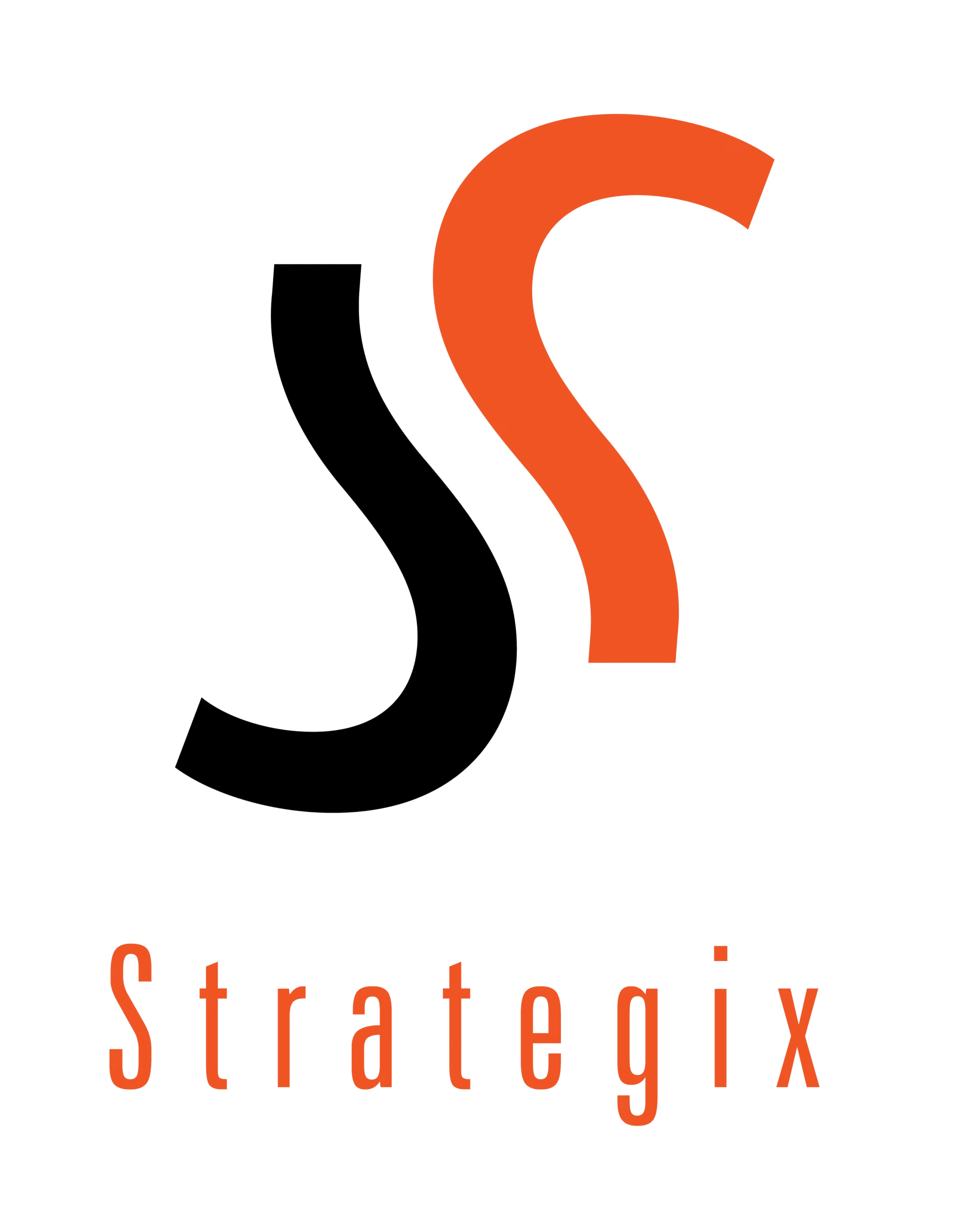
“With monday CRM, we’re finally able to adapt the platform to our needs — not the other way around. It gives us the flexibility to work smarter, cut costs, save time, and scale with confidence.”
Samuel Lobao | Contract Administrator & Special Projects, Strategix
“Now we have a lot less data, but it’s quality data. That change allows us to use AI confidently, without second-guessing the outputs.”
Elizabeth Gerbel | CEO
“Without monday CRM, we’d be chasing updates and fixing errors. Now we’re focused on growing the program — not just keeping up with it."
Quentin Williams | Head of Dropship, Freedom Furniture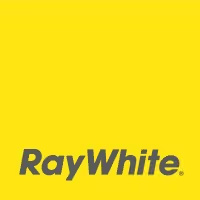
“There’s probably about a 70% increase in efficiency in regards to the admin tasks that were removed and automated, which is a huge win for us.“
Kyle Dorman | Department Manager - Operations, Ray White
"monday CRM helps us make sure the right people have immediate visibility into the information they need so we're not wasting time."
Luca Pope | Global Client Solutions Manager at Black Mountain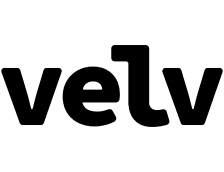
“In a couple of weeks, all of the team members were using monday CRM fully. The automations and the many integrations, make monday CRM the best CRM in the market right now.”
Nuno Godinho | CIO at VelvPitch deck software integration with CRM systems
After a strong presentation, teams often lose momentum due to manual data entry, scattered follow-ups, and decks disconnected from customer history. Integration eliminates these friction points.
A connected workflow removes repetitive administrative tasks and ensures continuity across interactions. Presentations, notes, deal stages, and follow-ups all live in one system.
Build smarter presentations, automatically
When your CRM feeds customer insights directly into the deck, personalization becomes instant. Instead of searching for context, your team pulls in past interactions, project updates, and custom details automatically.
monday CRM acts as the central hub, keeping the narrative aligned with the entire customer story.
Put your follow-ups on autopilot
Once a presentation ends, the system can update deal stages, assign tasks, and send personalized notes. Your pipeline advances even as your team prepares for the next big opportunity.
Engagement data helps categorize leads into fast-moving prospects or nurture sequences without manual sorting.
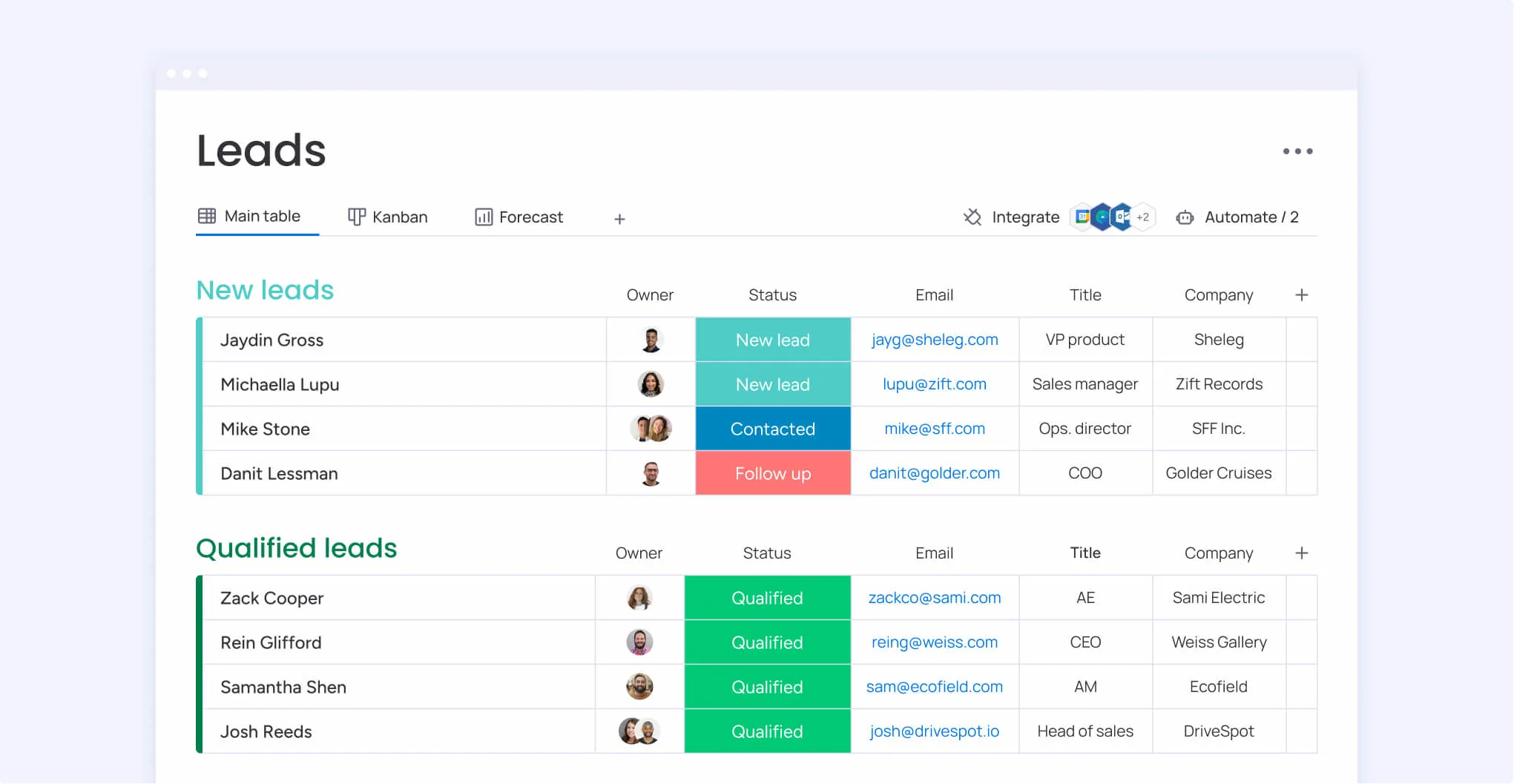
Get the visibility to win more deals
When presentation data and CRM data combine, you gain a complete picture of what resonates. Leaders can track slide performance, spot trends, coach precisely, and make decisions grounded in real behavior.
Dashboards in monday CRM turn this intelligence into a daily operating system, creating the confidence to refine your strategy and close deals faster.
How monday CRM turns great presentations into closed deals
monday CRM bridges the gap between a compelling presentation and a closed deal by unifying the entire sales playbook. It connects your presentation to every deal, task, and follow-up, ensuring no detail is lost in the transition between activities. The real work happens before and after the pitch, and disconnected tools often create more chaos than clarity.
Prevent opportunities from slipping through the cracks. Our automations function as a tireless assistant for your team, instantly triggering follow-ups and updating deal stages to free up representatives for what they do best: selling. With all your customer data centralized, your team can build hyper-personalized pitches that demonstrate a deep understanding of a prospect’s world.
It’s time to equip your team with a tool they will actually love using: one that gives them the confidence and control to turn every pitch into a win. See how monday CRM helps you build a faster, more aligned sales process from first impression to final handshake.
FAQs about pitch deck software
Can pitch deck software work offline?
Most platforms require an internet connection for full features like collaboration, but some allow for limited offline editing.
How secure is business data in pitch deck software?
Reputable platforms use enterprise-grade security like encryption and access controls to protect your data. Look for key compliance certifications to ensure your information is safe.
What distinguishes free pitch deck software from paid versions?
Free versions typically offer basic features with limits on templates and collaboration, while paid plans unlock advanced analytics, more storage, and enhanced team capabilities.
Can pitch deck software create multiple presentation versions for different audiences?
Yes, professional platforms allow you to easily create and customize multiple versions of a presentation for different audiences while maintaining brand consistency.
How do you measure pitch deck effectiveness?
Effectiveness is measured through built-in analytics that track viewer engagement, such as time spent on each slide, interaction rates, and conversion tracking.
Which pitch deck software integrates most effectively with CRM systems?
Platforms with native integrations, like monday CRM, provide the most seamless connection by automatically syncing presentation data with your sales pipeline. Other software may rely on third-party tools or API connections for integration.

